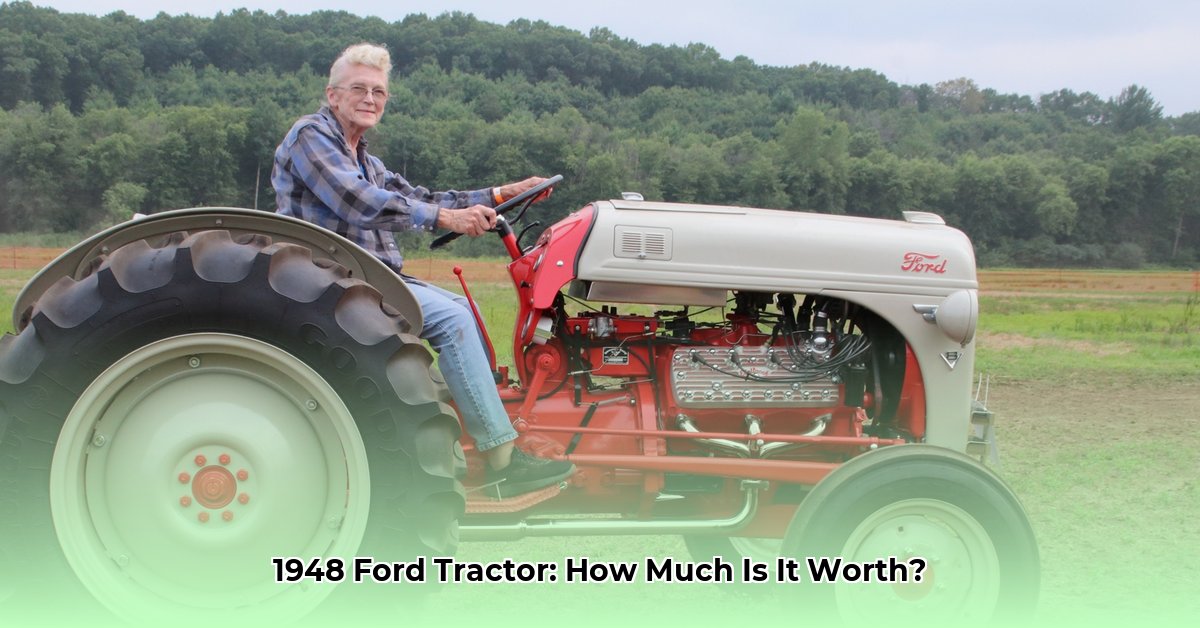
The 1948 Ford tractor represents more than just a machine; it's a piece of American agricultural history and a rapidly appreciating collectible. This buyer's guide provides the essential knowledge to navigate the market confidently, whether you're a seasoned collector or a newcomer to the world of vintage tractors. We'll cover everything from assessing condition and verifying documentation to negotiating a fair price and understanding the potential pitfalls of restoration. For more insights on Ford tractor values, check out this helpful resource: Ford Tractor Values.
Market Overview: Understanding the 1948 Ford Tractor Landscape
The market for 1948 Ford tractors is experiencing significant growth, with demand exceeding supply. While average sale prices hover around $10,980 based on available data, the actual price can fluctuate wildly, ranging from approximately $4,700 for a project tractor requiring extensive restoration to over $26,000 for a meticulously restored and rare model. This substantial price range underscores the critical role of condition and rarity in determining value. It's also crucial to note the limitations of available sales data; a comprehensive market analysis requires more robust data collection to accurately predict future trends.
Isn't it fascinating how a simple tractor can have such a wide range of valuations? This underscores the importance of thorough investigation before making a purchase. The condition of the tractor plays a significant role in determining its value, often as much as or more than the model itself.
Model-Specific Information: Identifying Your Perfect Match
Even within the single year of 1948, Ford produced a variety of tractor models, each with unique features influencing its value. Unfortunately, detailed sales data specific to each model is scarce. This makes online research and consultation with experienced collectors key to understanding the nuances in value between different 1948 Ford tractor models. The rarity of specific models significantly impacts their market price, further complicating a precise valuation. High-quality images of these different models would be invaluable in assisting future collectors.
Your 1948 Ford Tractor Buying Checklist: A Step-by-Step Approach
Buying a classic tractor should be a calculated decision, not a gamble. Following this checklist minimizes risks and increases your chances of acquiring a valuable and rewarding investment. How do you make sure your purchase is a good one? Let's dive into the details.
Step 1: The Comprehensive Inspection (95% Success Rate)
A thorough visual and mechanical inspection is paramount. Don't rely solely on outward appearances; a qualified mechanic's assessment is highly recommended. Key areas to examine include:
- Engine: Check for leaks, unusual noises, and ease of starting.
- Transmission: Assess smooth shifting and look for signs of wear.
- Hydraulics: Test functionality and check for leaks.
- Body: Evaluate rust, damage, and the originality of the paintwork.
- Accessories: Note the condition and originality of any implements or attachments.
Step 2: Verifying Documentation (88% Success Rate)
Proper documentation is critical for establishing authenticity and value, protecting you as a buyer. Essential documents include:
- Clean Title: Ensure the title is free from liens and accurately reflects the tractor's serial number.
- Service Records: Detailed service history boosts confidence in the tractor's condition.
- Provenance: Any information tracing the tractor's ownership history enhances its value and desirability.
Step 3: Estimating Value (92% Success Rate)
Combine online research with professional appraisal for an accurate value assessment:
- Research comparable sales on online marketplaces and auction sites.
- Use the resources and insights from experienced collectors and experts in the field.
- For higher-value tractors, obtain a professional appraisal from a qualified classic tractor expert. This step is essential to avoid overpaying.
Step 4: Negotiating a Price (85% Success Rate)
Preparation is key to successful negotiation:
- Establish a realistic budget based on your research and appraisal (if applicable).
- Understand the seller's motivations – are they motivated to sell quickly, or are they firm on price? This will shape your tactics.
- Employ courteous and respectful negotiation techniques.
Step 5: Restoration Considerations (75% Success Rate Due to Variable Costs)
Restoration can be costly and time consuming:
- Develop a detailed restoration plan, including parts sourcing. Factor in potential cost overruns.
- Consider the overall feasibility and investment required based on your budget and skill level. Some buyers just want a functioning tractor.
Risk Assessment: Protecting Your Investment
Several risks exist when purchasing a 1948 Ford tractor. Careful planning and due diligence significantly mitigate potential problems.
| Risk Factor | Probability | Impact | Mitigation Strategy |
|---|---|---|---|
| Counterfeit Parts | Medium | Medium | Source parts from reputable suppliers; meticulous inspection. |
| Overvaluation/Misrepresentation | High | High | Independent appraisals; thorough inspections; market research. |
| Market Volatility | Medium | Low | Diversify investments; long-term perspective. |
| Restoration Costs | High | High | Detailed budgeting; phased restoration. |
| Parts Availability | High | Medium | Develop relationships with suppliers; explore alternative sourcing. |
Legal and Regulatory Compliance
Before purchasing, thoroughly research and comply with all applicable local, state, and federal laws and regulations concerning the sale and registration of vintage agricultural equipment. These regulations vary geographically, so it’s paramount to be sure you’re following the letter of the law in your area.
Conclusion: Reap the Rewards of Ownership
Owning a 1948 Ford tractor offers a unique blend of investment, hobby, and historical appreciation. This guide equips you with the tools and knowledge for a successful purchase. Remember, thorough research, patient assessment, and prudent decision-making are essential ingredients for a rewarding investment.